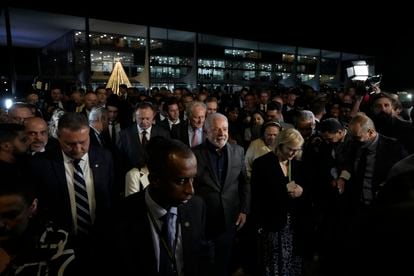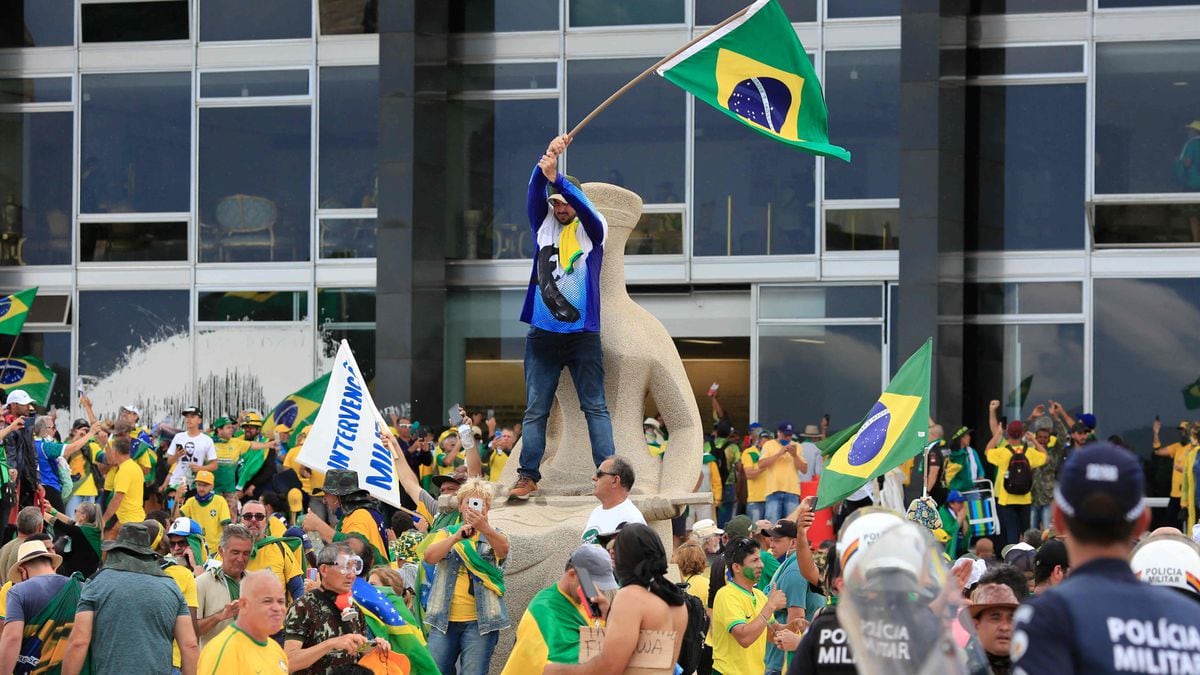“Backed by Congress and Supreme Court, Lula restores order in Brazil with wave of arrests”, El Pais
Naiara Galarraga Gortázar, Brasilia, Jan 10, 2023
The governor of the federal district has been suspended for 90 days after he did nothing to stop extremists from storming government buildings. President Lula da Silva has accepted an invitation to the White House in February
The highest authorities of the Republic of Brazil were summoned by the newly-inaugurated president, Luiz Inácio Lula da Silva – popularly known as “Lula” – this past Monday. The subsequent high-level meeting took place only 24 hours after a mob of rioters assaulted the government institutions in Brasilia. The violent protestors were supporters of Jair Bolsonaro, 67, who narrowly lost his re-election bid to Lula in October 2022.
The 77-year-old president – who previously governed Brazil from 2003 until 2010 – convened the session at the Planalto Palace, the official workplace of the presidency. Attendees included Supreme Court President Rosa Weber, President of the Chamber of Deputies Arthur Lira and Senate President Rodrigo Pacheco. Defense Minister José Múcio and the recently-appointed heads of the Armed Forces were also summoned.
Lira – despite being a supporter of Bolsonaro – joined the unanimous condemnation of the assault by the highest representatives of the country’s democratic institutions.
After the meeting, the leaders of the three branches of government released a joint statement, condemning the “terrorism, vandalism and criminal acts” committed on Sunday. The storming of key government buildings was described as an “attempted coup.”
Ibaneis Rocha – the governor of the Federal District – has been suspended from office for three months by the Supreme Court, for not having done enough to stop the extremists from storming the headquarters of the country’s democratic institutions.
On Monday afternoon, Lula also met with the governors of Brazil’s 26 states, after speaking by phone with the prime minister of Portugal, António Costa, and with US president Joe Biden, who invited him to visit the White House at the beginning of February. The Brazilian president has accepted, according to a note from his team.
President Biden has expressed the “unconditional support of the United States to Brazilian democracy and to the will expressed by the people in the last elections, which Lula won.”
On the ninth day of his new term, Lula is facing the most serious threat to Brazilian democracy since the end of the military dictatorship in 1985. It is the culmination of months of tensions, fueled by the far-right ex-president Bolsonaro, who is currently in Orlando, Florida. He flew there after refusing to attend Lula’s inauguration.

Bolsonaro’s loyalists – dressed in the yellow and green colors of the Brazilian flag – imitated the Trumpists who staged an assault on the Capitol Building in Washington, DC two years ago. The difference was that, in Brasilia, the institutions that were stormed were not in session and there were no deaths. Within four hours, the security forces managed to regain control of the three buildings, arresting hundreds of rioters in the process.
The Congress, the presidential palace and the Supreme Court of Brazil were attacked by thousands of pro-Bolsonaro protestors, who claimed that their candidate lost the October elections because of fraud. On Twitter, Bolsonaro – who repeatedly sowed doubt in Brazil’s voting system throughout 2022 – made a lukewarm condemnation of the attack. Meanwhile, Lula accused his predecessor of encouraging “fascist vandals.”
Before being evicted from Congress by the police, the assailants destroyed furniture and works of art and broke pieces of the glass facades. Valuable art installations – the heritage of Brazil’s modernist movement – were ruined. Ironically, the capital of Brazil was moved from Rio de Janeiro to Brasilia – a futuristic city in the interior of the country – so that democratic institutions and artworks would be shielded from the potential violence of mass protests.
The assault occurred in the same place where, just a week earlier, a festive crowd of 300,000 Lula supporters – along with dozens of foreign heads of state – had celebrated the former president’s return to power for a third term.
On Monday morning, the police evicted the protestors’ camp set up in front of the Army headquarters in Brasilia. Between 1,200 and 1,400 people were detained for identification, according to Army spokesman Colonel Marcos André Benzecry. The active pro-Bolsonaro rioters, meanwhile, were taken to a different location to be identified and searched.
“We’re now going to confirm if they had anything to do with the acts of vandalism on Sunday,” Benzecry told the media.
The temporarily-ousted governor of the Federal District – who did not utilize the Military Police to deter rioters – apologized to Lula on Sunday. His secretary of security – the former minister of police under Bolsonaro – was vacationing in Florida (like Bolsonaro) when the capital’s buildings were stormed.
Bolsonaro – who no longer has presidential immunity – could potentially be prosecuted for any of the multiple investigations opened against him. Some suspect that this is why he left the country before Lula’s inauguration.
The assault was still underway when Lula – in his capacity as head of state – ordered that the federal government assume command of the security forces in the capital, taking the authority away from the local governor. Many of the invaders managed to reach the political heart of Brazil in hundreds of buses, or by simply walking – some were even escorted by the Military Police.
At least 300 people accused of participating in the invasion have been detained. The Brazilian press is generally referring to these individuals as “terrorists” – once an unusual term in Latin America’s largest country, or at least until Christmas Eve, when the police arrested a Bolsonaro supporter for attempting to perpetrate an attack with explosives
